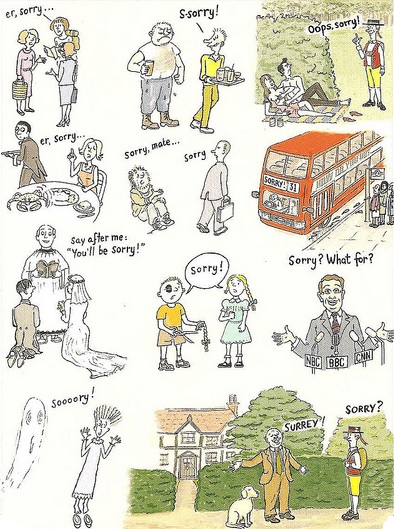For many novice travelers, the language barrier becomes an insurmountable barrier to independent travel. Having mastered the main phrases in english language for tourists, you can safely go to almost any country in the world.
This article is intended not only to teach you English, but to convince you that not knowing the language cannot be an obstacle to travel. You will understand this as soon as you have the opportunity to communicate with a foreigner for the first time, without outside help. We immediately remember what we were taught at school, trying to make a grammatically correct sentence, not forgetting the coordination of times ...
Forget about it, everything is much simpler than you imagine. Residents of tourist countries have long been accustomed to broken phrases, often do not shine themselves, so English for tourists is simple and concise.
- Do not miss:

If you are just starting to learn English for tourists, do not bother with unnecessary words at this stage. Learn only the basic phrases, the rest will come by itself in time. For example, instead of memorizing the expressions “good morning”, “good afternoon” and so on, remember the simple but effective at any time of the day “Hi!”. Otherwise, you run the risk of getting stuck on when “afternoon” ends and “evening” begins.
Hello Hello - Hi
Goodbye, Bye - Goodbye, Bye
Good night - Good night
Please - Please
Thanks - Thank you, Thanks
Sorry - Excuse me
How are you? - How are you?
Fine, thank you
What is your name? - What’s your name?
My name is ______ My name is ______
Pleased to meet you - Nice to meet you
Yes Yes
No - No
Good - Ok
Who - who
What - what
Why, Why - Why
When - When
Where - where
How - How.
Request for help
This moment is most scary for many tourists. Like, if something happens or I get lost, how do I explain this? Be sure that your facial expression will tell half of the necessary, and gestures and a few basic phrases will help with the rest. 
Help! - Help!
I don’t speak English - I don’t speak english
May I ask? - Can I ask you a question?
Help, please - Could you please help me?
Where is ______? - Where is the _______?
Street - Street
Turn left - Turn left
Turn right - Turn right
I'm lost - I’m lost
Does anyone speak English? - Does anyone here speak English?
Could you translate this for me? - Can you translate this for me?
Please write it down
I have lost my bag - I have lost my purse
I'm sick - I’m sick
I am injured - I’m injured
I need a doctor - I need a doctor
Can I use your phone? - Can I use your phone?
Transport
Even if you get lost in an unfamiliar airport, it will be enough to show one of the employees your boarding pass, and he will indicate where you should go for boarding. Words such as “passport control”, “baggage” do not require special knowledge of English. You will need only a few basic phrases.
Everyone wants to be able to maintain a conversation in English at least minimally, without waiting for an advanced level. We must be able to thank, ask for help, apologize,. Here we give the main phrases that are used every day, with transcription (for beginners) and examples of their use.
Practice these basic phrases daily, choosing a pair of expressions per day, after 15 days you will already know all of them. If possible, find a partner to help you with this. But no, don’t despair so much - just repeat them in any convenient suitable situation: at work in communication with colleagues, at home with members of your family, or simply speaking them out loud in private with yourself - this also helps in good memorization and development of pronunciation.
Basic English phrases used in different circumstances
Thanks so much - many thanks
[θæŋks səʊ mʌʧ]As variants of this phrase, we can say thank you so muchor thanks a lot.If it’s hard for you to express for what merits you thank your interlocutor, then just dwell on this expression. But, if you feel the strength in yourself, then you can add a few more words, for example:
Thanks so much for helping me. (Thanks so much for helping me)
Thank you so much for your congratulations. (Thanks so much for your congratulations)
I really appreciate - I really appreciate (I really appreciate ...)
You can also thank this phrase, or you can combine it with the previous one:
Thanks a lot for the invitation. I really appreciate it. (Many thanks for the invitation. I really appreciate this)
I’m sorry (Sorry) - sorry (I'm sorry)
Oh, this phrase the English repeat, probably, even in a dream. Other key phrases are repeated much less frequently. You can constantly hear it from friends as well as from strangers on the street. It’s not that they really did much harm, for which they would have to apologize, it’s just that their rules of decency are such that even for little things they are ready to apologize. Besides simple I’m sorry can also hear I’m so sorry or I’m really sorry, but it’s already for some “wrongdoing”, like, they crushed your foot or accidentally pushed in the crowd. Satirical picture from the book " How to be british"(How to be British) shows the different situations in which sorry

Excuse me - sorry
[ɪksˈkjuːz miː]
Another option is to apologize. Use this phrase if you need to go through and someone is standing in your way, or if you want to attract someone's attention. For example, you want to ask a passerby which bus goes to Denmark Hill station:
Excuse me, which bus goes to Denmark Hill station?
How does that sound? - How does this sound?
Although the literal translation of this phrase is “how does it sound?”, It means: “how do you like this idea?” Or simply “how do you like it?”. It can be used to find out the attitude of others towards your idea. For example:
We could have lunch at the restaurant, and then go on a trip. How does that sound? “We could have lunch at a restaurant, and then go on a trip.” How do you like this?
That sounds great - that sounds great
[ðæt saʊndz greɪt]
If you like the idea your interlocutor put forward, you can say that sounds great. This is often the answer to the question from the previous phrase: how does that sound? Word great can be replaced by a synonym, for example: fantastic, good, perfect, excellent.
- My sister invited us to dinner tonight. How does that sound? (My sister invites us to dinner tonight. How are you?)
— Oh, that sounds great! (Oh, that's great)
Never mind - it doesn’t matter (it doesn’t matter)
[ˈNɛvə maɪnd]You can apply this phrase in several cases. For example, you try to interpret something again and again to your interlocutor, but he does not understand. In the end, you despair and say:
Never mind, let’s talk about another subject (ok, forget it, let's talk about another topic)
Or this situation: you are looking for some thing in the store, the seller really wants to help you, but this thing is simply not in his store, which he informs you with regret. Then you, ending the conversation, say:
Never mind, I am going to look for it somewhere else (It's okay, I'll look for it somewhere else)
Remember only that the tone should be polite, on the face - a smile. If you say it slowly and with a downward intonation, it will sound as if you are expressing irritation.
What do you think? - What (how) do you think?
Use this expression when you want to know the opinion of the interlocutor, for example:
Our team is going to win today, what do you think? (Our team will win today, what do you think?)
Key phrases that beginners especially need
I’m learning English - I learn English
You must show the interlocutor that English is not your native language. You say I’m learning English and the interlocutor will understand that he should not demand too much from you.
I don’t understand - I don’t understand
Everything is simple here - you tell your interlocutor that you do not understand what he is talking about. You can also add an apology:
Sorry, I don’t understand (Sorry I do not understand)
Could you repeat that please? - Could you please repeat this, please?
If you do not understand, but still hope to understand, then ask to repeat the phrase again. Word please(please) can be put at the end of a phrase, or can be after a pronoun you:
Could you please repeat that?
And don't forget the word thatotherwise, it will turn out to be a very bad situation, as if you are asking the interlocutor to vomit.
Could you please talk more slowly? - Can you speak slowly?
The English can speak very quickly, shortening words using slang. It will be difficult for you to understand them, just ask them to speak more slowly. It is likely that then you will understand what is at stake.
Thank you. That helps a lot - Thank you. It really helped.
[θæŋk juː. ðæt hɛlps ə lɒt]After you have asked to speak more slowly, thank these phrases.
You can use them in other situations:
Should you please turn down the music. I can not hear you very well.
(Could you turn the music down. I can't hear you well.)
Of course, I’ll turn off the radio
. (of course I'll turn off the radio)
Thank you. That helps a lot
.
What does it mean? - What does it mean?
If you hear a new concept for you, ask what it means. Instead it it’s better to use a specific word. For example, you heard the word mute (dumb) ask:
What does "mute" mean?(What does mute mean?)
How do you spell that? - How is it spelled?
Be sure to learn this phrase, as English spelling can be quite complicated. Suppose you are given a name that will be difficult to repeat. Ask to spell it, it's called spelling.
— My name is Ellowyn. (My name is Eloin)
This is a complex name and you want to clarify how it is spelled: How do you spell that?
What do you mean? - What do you have in mind?
If you understand all the words that your interlocutor said, but do not understand the meaning of everything said as a whole, ask this question. Maybe your friend said the idiom, and you're trying to translate it literally. Clarify this question:
— He stays as cool as a cucumber
(He's as cool as a cucumber)
— What do you mean?
(What do you mean?)
— I mean that he is calm and relax even if everything seems to be going wrong.
(I mean that he is calm and relaxed, even if it seems that everything is going wrong)

Key phrases for dating
Hi! I’m ... (Your name). And you? - Hi, my name is ....... What about you?
An informal way to get to know each other: give your name and ask the name of another person. Another dating option:
Hi! My name is Mirvary. And what is your name? (Hi, my name is Mirwari. What is your name?)
Nice to meet you - Nice to meet you
After you know each other's names, it will be very polite to say “ nice to meet you". The answer should be the phrase: " nice to meet you too"(I am also pleased)
Where are you from? - Where are you from?
Want to know which country your friend arrived from? Ask him this question. In turn, you must say about yourself: “ I’m from Russia»
What do you do? - What do you do?
And this question clarifies how you earn your living. Of course, this applies to adults. Not everyone loves this kind of questions, however, if you were asked it, then you should at least know what it is about.
— What do you do, Mirvary?
(What are you doing, Mirvari?)
— I’m a teacher.
(I'am a teacher)
What do you like to do? - What do you like to do?
wɒt duː juː laɪk tuː duː (ɪn jɔː friː taɪm)
This means what you like to do in your free time, that is, what is your hobby. May be an addendum to the question: in your free time(in his spare time).
I like to ride horses. And you? What do you like to do? (I like to ride horses. And you? What do you like to do?)
What’s your phone number? - What's your phone number?
What’s your email address?(What is your email address?)
Key phrases for work
How can I help you? - How can I help you?
If your work is related to the provision of services, then you will ask this question very often. In addition, it is customary to answer phone calls. So remember!
I’ll be with you in a moment - I will be with you very soon
If someone is waiting for you, and you must finish the work begun earlier, use this expression. By the way, instead momentcan say minute (minute).
What time is our meeting? - What time is our meeting?
The structure of this issue is suitable not only for the meeting, but also for any other planned event. For example:
What time is our dinner on Monday? (What time is our dinner on Monday?)
Please call me back at (phone number) - Please call me back ...
Do you want to be called back? Then this phrase with the addition of the phone number itself will be most welcome.
(Oh really?) Actually, I thought ... - Really? I actually thought ...
[(əʊ ˈrɪəli?) ˈækʧʊəli, aɪ θɔːt ...]Suppose that you do not agree with the speaker, but do not want to complicate the relationship. Then this phrase will help to politely express your opinion on this issue. For example:
— Tom today serves our guests
(Tom serves our guests today)
— Actually, I thought he is ill
(Actually, I thought he was sick)
— Oh really? Then I have to specify the information
(Really? Then I have to clarify the information)
Instead of the word thought You can use any other verbs. For example:
Oh really? Actually, I heard his mother is in Australia . (Really? Actually, I heard that his mother is in Australia)
I’m just about to [any verb] - I'm just going to ....
If you are going to do something soon, then report it:
I’m just about to make a cup of tea (I was just about to make a cup of tea)
Do you often have to do such a pleasant thing as retelling rumors? Well, or information heard from someone else?
We all sometimes retell the news of others. And then, to emphasize that information is not first-hand, we use different introductory words.
For example:
“They say that rabbits love chocolate. ”
“Report that Bill Gates always wears different socks. ”
“Dear children! Well knownthat Santa Claus loves only very short verses! ”
See? We said "they say ”To emphasize: with our own eyes we did not see rabbits eating chocolate. And this is just the information we heard from someone.
The easiest way is to say one of the introductory phrases:It’s said / It’s reported / It’s known. That is, after “it is” say the third form some verb that we use, referring to someone else’s opinion (“say”, “report”, “know”, etc.). And then add “that” and calmly continue the phrase.
For example:
It’s said that rabbits love chocolate.
It’s reported that Bill Gates always wears different socks.
Dearest children, it’s well known that Santa loves only very short poems!
Here are some more typical phrases for this design:
It’s supposed that - they believe that ...
It’s considered that - It's believed that...
It’s thought - they think that ...
It’s believed - believe that ...
The design is good, and use it often. Let’s say again why: to retell someone else’s words, to emphasize that the speaker took information not from his own head, but from other sources.
But, unfortunately (or fortunately), there are always people who need more than just expressing their thoughts. They want to do this in some sophisticated way. So, they often use a different, slightly more complex design.
Look carefully, here it is, this tricky trick:
Suppose we need to say:Report that Bill Gates wears different socks.
We take the subject (“Bill Gates”) and put the verb after itto be. It turns out “Bill Gates is”.
Then we say the third form a verb conveying the opinions of others (“report” - “reported ”). It turns out “Bill Gates is reported”.
Then we say our infinitive main verb, not forgetting the “to” (“To wear” - “to wear”). It turns out “Bill Gatesis reported to wear different socks ”.
What time! Let's read it aloud again (I emphasize ALUD):Bill Gates is reported to wear different socks. Recall - how is this translated? That's right, “Report that Bill Gates wears different socks.”
If you translate this phrase literally, you get nonsense: “Bill Gates have reported to wear different socks.” But it sounds bad only in Russian. And in English, on the contrary, it’s wonderful.
You may ask: is such a construction often used? And you open any English newspaper. And you will see: constantly.
Let's try to do the same trick with the phrase: "They believe that aliens teach the English farmers the Martian language."
Aliens are.
believed.
to teach.
Put it all together and stick the rest:Aliens are believed to teach English farmers the Martian language.
Since the design is not easy, let's do one more phrase together. For example, “Nelson Mandela is said to chop dry banana roots quite infrequently.”
We take the subject and immediately cling to the verb “to be”:Nelson Mandela is.
We take the third form of the verb conveying the opinions of others:said.
Take the infinitive of the main verb with the “to” part:to chop.
We put everything together and put the rest:Nelson Mandela is said to chop dry banana roots not too often.
So, here is how we translate two sentences from the beginning of this note:
They say that rabbits love chocolate - Rabbitsare said to love chocolate.
Dear children! Well knownthat Santa Claus loves only short verses! - Dearest children,Santa is well known to love only very short poems!
(And we have already translated about Bill Gates and socks. By the way, I lied: Bill Gates wears the same socks. It was I, out of respect for his genius, who attributed to him the Einstein trait.)
Now let's do the exercise.
Read english phrase. And remake it using our design.
1 Many people think that coca-cola is the best drink.
2 A lot of people believe that footballers listen to Mozart before matches.
3 Newspapers say that Angela Merkel drinks Schnapps every morning.
4 Some people think that Swiss knives are the best.
5 Many people suppose that the US dollar will collapse soon.
6 We know that parrots can understand hundreds of words.
7 TV channels report that winter will arrive very early this year.
8 Some people consider that Holland has two capitals.
See you soon!
Anton Brejestovski
The key to exercise
1 Coca-cola is thought to be the best drink.
2 Footballers are believed to listen to Mozart before matches
3 Angela Merkel is said to drink Schnapps every morning.
4 Swiss knives are thought to be the best.
5 The US dollaris supposed to collapse soon.
6 parrotsare known to understand hundreds of words.
7 Winteris reported to arrive very early this year.
8 Hollandis considered to have two capitals - Amsterdam and the Hague.


